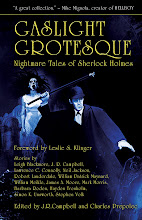Sherlockian reviewer, and compiler of the pastiche database, Philip K. Jones has provided the following review of GASLIGHT GROTESQUE: NIGHTMARE TALES OF SHERLOCK HOLMES to the editors and has also posted it to Amazon.Com.
"This is a collection of Sherlockian tales in which, to quote Leslie S. Klinger's Forward, "...the pillar of Victorian reason and intellect, Sherlock Holmes, would be called upon to confront the forces of darkness in every form." Make no mistake. This is a collection of horror stories, not the usual Sherlockian investigations of human crime. In this book, Holmes and Watson deal with monsters, not twisted humans, but horrors out of myth and nightmare
In the opening tale, "Hounded," by Stephen Volk, Watson attends a seance. What he finds there is what he had hoped to escape, his own memories of The Hound. Once confronted, they lead him to his only escape. "The Death Lantern,"by Lawrence C. Connolly, tells of a magician who filmed himself practicing one of his illusions, catching an explosive bullet in his teeth. The early silent movie is destroyed after Holmes, Watson and Lestrade witness the death(?) of the magician. William Meikle's "The Quality of Mercy" is a story of an old Army friend of Watson's yearning for a dead sweetheart. The form that desire takes is gruesome to say the least.
"Emily's Kiss," by James A. Moore, is one of the most horrifying tales in my opinion. The events are described but the cause and explanation are never stated explicitly, leaving the imagination of the reader to fill in the blanks, over and over and over again. "The Tragic Case of the Child Prodigy," by William Patrick Maynard, has an Aleister Crowley surrogate, disguised as one "Christopher Frawley," preying on an ambitious `stage mother' to control the income generated by a young violinist. "The Last Windigo," by Hayden Trenholm, has Holmes an Watson sent to Canada by Mycroft on The Queen's Business. While waiting for the situation to develop, they stumble on a land theft scheme that is being contested by the local natives. Resolving that dispute requires more than logic and diplomacy.
In "Celeste," by Neil Jackson, Holmes and Watson work, at the request of The Prince of Wales, to put a final end to the recurring nightmare of a ghost ship. "The Best Laid Plans," by Robert Lauderdale, presents an alternative view of events in "The Final Problem," as seen through the eyes of Inspector Lestrade. The view is neither pretty nor simple. "Exalted Are the Forces of Darkness," by Leigh Blackmore introduces Aleister Crowley, this time as an ally of Holmes in dealing with a conjured Demon attacking members of The Golden Dawn. "The Affair of the Heart," by Mark Morris, introduces Holmes to a sort of time travel, which engulfs him and Watson in a trap of double jeopardy. "The Hand-Delivered Letter," by Simon Kurt Unsworth, brings back Moriarty, in a truly stunning and terrifying revenge. "On the Origin of the Hound of the Baskervilles," by Barbera Roden, fills in the untold bits of HOUN deftly and seamlessly and horribly. J. R. Campbell's "Mr. Other's Children" finishes the book on a note of true terror. It's villain escapes and leaves the world at risk.
Sherlockians are not as likely to recognise many of the authors, other than Barbera Roden and J. R. Campbell, since most have worked in the horror genre rather than in detective tales up to this time. That takes nothing away from their abilities and the errors for purists are mostly confined to the villains and `ghosties' introduced, rather than to Canonical problems. In addition, most are not Americans, so the `slanguage' problems are not nearly so much in evidence as in most recent anthologies."
Edge-Lit and Titans tour on the horizon
3 months ago








No comments:
Post a Comment